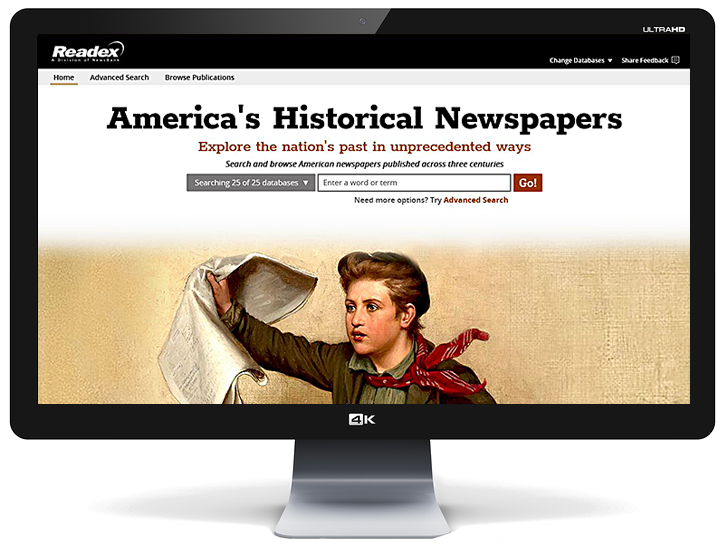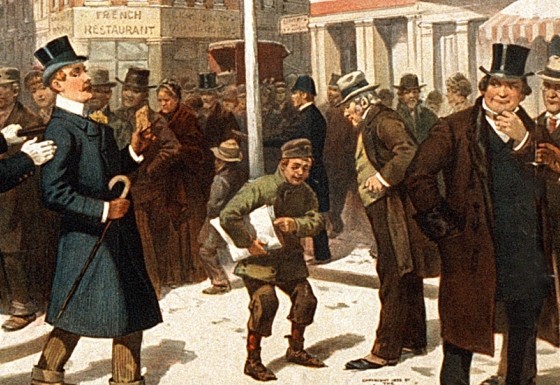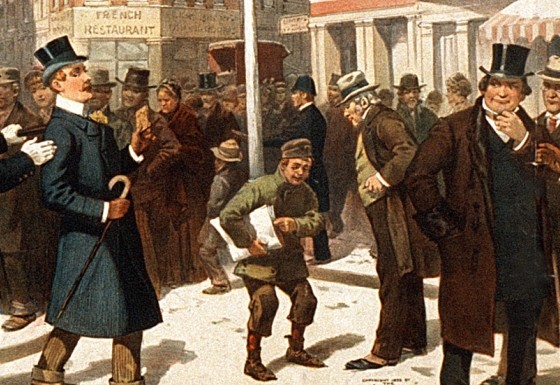
Early American Newspapers: Series 14, 1807-1880
The Expansion of Urban America
- Dozens of the most notable metropolitan U.S. newspapers to emerge in the 19th century
- Long, continuous runs chronicle the growth of urban America during a time of profound change
- New forms of journalism provide critical coverage of daily life, politics, literature, religion and popular culture
Early American Newspapers, Series 14, 1807-1880 offers digital editions of many of the most notable 19th-century newspapers from America’s urban centers. It delivers long runs of 48 major titles published in 34 towns and cities in 15 states and the District of Columbia. Each title has been selected not only to represent the new forms of journalism that emerged during this pivotal period in U.S. history, but also to enable longitudinal studies—an increasingly popular methodology for historical and literary research. Together, their outstanding coverage of metropolitan life in the 19th-century United States will enable students and scholars to make fresh discoveries within innumerable topics crucial to American studies.
For teaching and research across the humanities and social sciences
The 19th century was a time of profound transformation for American journalism. In urban areas in particular, newspapers began venturing beyond politics and economics to report on literature, religion, art and popular culture. Many papers shed their political party affiliations and began reporting on the views of diverse factions. Surging populations in America’s cities made leading publishers highly profitable, enabling them to print larger editions with more detailed articles.
Even the concept of news itself changed; newspapers began covering sports, travel, society, health, food and humor. For today’s researchers, these changes could not have occurred at a better time: just as debates over slavery, immigration, women’s suffrage and worker’s rights began intensifying, newspapers began publishing real debates that reflected viewpoints of wide-ranging racial and socio-economic groups. The 48 metropolitan newspapers in Series 14 were selected to reflect these changes, and to provide lengthy, continuous runs of many of the most noteworthy newspapers to emerge during the 19th century.
Exclusive digital access to famous and influential urban papers
Prominent titles in Series 14 include the New York Journal of Commerce, Democratic Press (Philadelphia), Liberty Hall and Cincinnati Gazette, Detroit Advertiser and Tribune and many others—all of which strongly support the 19th-century U.S. history curriculum. Also here are three of the century’s best known literary newspapers: the Boston True Flag, New York Evening Mirror and New York Atlas. These titles support literature studies through their reviews of the American literary canon as well as hundreds of actual literary works not readily available elsewhere. Other titles are the Washington Globe, D.C.’s most powerful paper during the Jacksonian Era; Lutheran Observer, one of the period’s most important religious publications; Paterson Daily Press, which stood up for women’s suffrage; Gloucester Telegraph, a forceful temperance title; Buffalo Morning Express, which fostered the modern Republican Party; and dozens of other titles that shaped national debates over significant issues. In addition, Series 14 will be heavily used by researchers in economics, political science, religious studies, ethnic studies and sociology.
Superior bibliographic control
Like other series of Early American Newspapers, Series 14 offers many significant titles from the authoritative bibliographies by Clarence S. Brigham and Winifred Gregory. A distinguished academic advisory board guided the title selection process.
The Early American Newspapers series is available within America’s Historical Newspapers.
Unprecedented coverage from every state west of the Mississippi River
A unique, on-the-scene history of America’s ethnic cultures
New York Journal of Commerce (New York, NY; 1828-1876)
- One of the most influential and innovative newspapers of the nineteenth century, the Journal of Commerce was founded by Samuel Morse and Arthur Tappan. It operated two deep-water schooners to intercept incoming vessels at sea in order to get stories ahead of the competition, and following Morse’s invention of the telegraph it was a founding member of the Associated Press. It was also one of the most fearless papers in New York: Its editors were staunch opponents of slavery but also critics of the abolitionists, and they decried the tactics of the war wing of the Republican Party. After the Civil War broke out the government suspended the paper’s mail privileges, effectively interrupting its publication, on grounds of “disloyalty.” President Lincoln later ordered the paper closed, but it soon reopened and continued to publish the eloquent, detailed, and controversial views that make it today one of the most heavily researched newspaper of the nineteenth century.
Washington Globe (Washington, D.C.; 1831-1843)
- During the era covered here the Globe was the most powerful newspaper in the Capital, as well as the official organ of President Andrew Jackson. Its publisher, Francis P. Blair, and his senor colleagues at the Globe split their time between running the paper and running the country. Intimate companions of “old Andy,” they formed the original “Kitchen Cabinet,” and are said to have wielded more power than Jackson’s official cabinet. “Old Andy would lie on a couch and smoke and dictate his ideas to Kendall…and then Blair would write and re-write the paragraphs that were to crackle in the Globe the next day.” (Mott, American Journalism.)
Liberty Hall and Cincinnati Gazette (Cincinnati, OH; 1821-1856)
- The Liberty Hall and Cincinnati Gazette was the most important newspaper in Ohio during much of the early nineteenth century. For much of the run included here it was edited by Charles Hammond, a prominent Ohio legislator who would later turn down a seat on the United States Supreme Court to run the paper. “Hammond published a steady stream of commentary on law, politics, and public affairs. William Henry Smith, who coordinated and managed the Associated Press, described Hammond as ‘the most distinguished American editor of his day.’” (Mott, American Journalism)
New York Evening Mirror (New York, NY; 1844-1858)
- The Evening Mirror was one of the most important nineteenth century newspapers that included coverage of arts and literature as well as local news. Founded by the poet and songwriter George Pope Morris and co-edited by the poet and travel writer Nathanial Parker Willis, the Evening Mirror employed many well-known literary figures of the day (including Edgar Allen Poe). Its editors monitored the literary works of authors in both America and Europe, and published many of them in the Mirror, often with critical essays attached. In 1845 the Mirror published an “advance copy” of Poe’s The Raven—the first time the poem appeared under the author’s name. The Mirror also issued an anthology called The Prose and Poetry of America in 1845. Today, the Mirror is one of the most heavily researched early American newspapers for the study and teaching of American literature.
New York Atlas/Morning Atlas (New York, NY; 1840-1853)
- One of the highest circulation Sunday papers in the nation, the Atlas battled for improved conditions for workers, and became famous for its coverage of the arts, literature, and popular culture. Notable contributors included Bret Harte (whose first poem was published in the Atlas when he was eleven years old), Walt Whitman, P.T. Barnum (who sent the Atlas 100 letters from Europe during his acclaimed European tour), and the poet Ada Clare.
Democratic Press (Philadelphia, PA; 1807-1820)
- One of the most eloquent and fearless political papers of the early nineteenth century, John Binn’s Democratic Presswaged a continuous battle with William Duane’s Philadelphia Aurora. The issues over which these papers debated split Pennsylvania’s Democrats into rival factions that would play a central role in the evolution of national politics in the decades leading up to the Civil War.
Paterson Daily Press (Paterson, NJ; 1853-1876)
- During the era covered here, the Daily Press was the largest paper in Paterson, New Jersey, a major industrial center at the time. The Daily Press took a progressive and sympathetic attitude toward the plight of immigrant workers and women workers, and is heavily researched for its coverage of the woman’s suffrage moment. In 1869, when the New Jersey Woman Suffrage Association presented a petition to the New Jersey Senate requesting woman’s suffrage and the reform of married women’s property rights, the Daily Press covered in scathing detail the mockery with which the petition was received. Its coverage of this and many other related events provides scholars with rare reporting on the chilling ridicule to which early suffragists were subjected, even in state legislatures of the late nineteenth century.
Raleigh Sentinel (Raleigh, NC; 1853-1876)
- The Raleigh Sentinel was the voice of the Democratic Party in Raleigh and one of the most influential and controversial newspapers in North Carolina. Fearless in its editorial positions, its offices were bombed with gunpowder in 1872. Undaunted, its editor Josiah Turner continued a fervid campaign against carpetbaggers and sided with Horace Greeley’s New York Herald in a campaign to expose the corruption of the Grant Administration. The Sentinel is heavily studied today for its chronicling of the Reconstruction Era.
Detroit Advertiser and Tribune (Detroit, MI; 1862-1876)
- The Republican Detroit Advertiser and Tribune and the Democratic Detroit Free Press were the two major papers in Detroit during the era covered here, and both papers are heavily researched today for their editorial positions on civil rights issues. The Advertiser and Tribune represented a Radical Republican view: It supported abolition absolutely, and black rights to a larger extent than many other newspapers at the time. It also supported Lincoln, but argued that he was not radical enough in his support of emancipation, the use of black soldiers, and African-American rights in general. These views, and the thoughtful manner that they were presented in the Advertiser and Tribune’s editorials, have made it a popular reference for teaching and researching the evolution of Civil Rights legislation in nineteenth-century America.
Buffalo Morning Express (Buffalo, NY; 1849-1855)
- One of the major newspapers in upstate New York, the Morning Express is particularly interesting to historians for its chronicling of the formation of the modern Republican Party. Its founder and publisher, Almon Mason Clapp, served in the New York State Assembly in 1853 as a Whig, but by 1856 he was a leader at the Pittsburgh convention of the new Republican Party. The articles and editorials of the Morning Express provide scholars with a detailed history of the changing attitudes that led to the founding of the Republican Party and the election of Abraham Lincoln to the presidency.
Lutheran Observer (Baltimore, MD; 1840-1876)
- The Lutheran faith-based Lutheran Observer was one of the most prominent religious newspapers of the nineteenth century. Its editor, Benjamin Kurtz, was regarded as one of the most eloquent men of his time; he traveled extensively in Europe during his tenure with the paper, and under his leadership the Observer gained a national audience, in part due to the international perspective that he brought to the paper.
Boston True Flag (Boston, MA; 1851-1876)
- The True Flag was a literary newspaper that published the fiction of many notable American writers, including many women authors. Its contributors included Susan E. Dickinson, Louise Chandler Moulton, Francis A. Corey, Fanny Fern, Oliver Optic, and John Townsend Trowbridge. Mark Twain admired the paper, and mentions it in his 1855 sketch “Jul'us Cesar”: “He was decidedly literary, after a fashion of his own, and the gems which find their way before the public through the medium of the Flag of our Union and Boston True Flag…were food and drink to his soul.”
Stay in Touch
Receive product news, special offers and invitations, or the acclaimed Readex Report
Sign UpBy clicking "Sign Up", you acknowledge that you have read and understand our Privacy Policy and Terms of Use.





